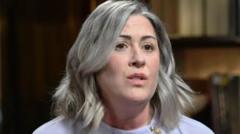Caroline Darian opens up about the shocking revelations of her father's crimes and advocates against chemical submission.
Daughter of Dominique Pelicot: "He Should Die in Prison"

Daughter of Dominique Pelicot: "He Should Die in Prison"
Caroline Darian speaks out about her father's horrific sexual abuse of her mother.
In an emotional account shared with BBC Radio 4, Caroline Darian expressed her outrage over her father Dominique Pelicot's sexual crimes, affirming, "He should die in prison." In November 2020, Caroline received devastating news from her mother, Gisèle Pelicot, revealing that Dominique had systematically drugged her for nearly a decade, enabling multiple men to rape her. Caroline reflected on the moment she learned the truth, describing it as an earthquake that shattered her understanding of reality.
Dominique Pelicot, recently sentenced to 20 years for his abominable actions, had preyed on fifty different men to assault Gisèle. His capture came unexpectedly when police investigated a seemingly innocuous incident of upskirting in a supermarket. Upon reviewing his electronic devices, authorities found thousands of disturbing images and videos of Gisèle, unconscious and violated by strangers.
The trial not only brought attention to Pelicot's crimes but also shone a light on the critical issue of chemical submission, a form of drug-facilitated sexual assault that often leaves victims without any memory or evidence of the attack. Caroline has now dedicated her life to raising awareness about these underreported crimes, emphasizing the importance of education around consent and sexual abuse.
In the wake of her father's crimes, Caroline wrote a confronting memoir titled “I’ll Never Call Him Dad Again,” which details her family’s trauma and the pervasive issue of drug-facilitated assaults. As she grappled with the shocking discovery of photographs that depicted her as a victim, the emotional turmoil intensified when the police confirmed her identity in the images. Caroline insisted, "I know that he drugged me, probably for sexual abuse," though lacks tangible proof—a reality faced by countless abuse victims.
The emotional impacts on her mother have been profound, making it difficult for Gisèle to accept the possibility that her husband was also an abuser to their daughter. Despite the grief and chaos that surrounded the trial, both Gisèle and Caroline recognized the necessity of public exposure—advocating for justice and awareness in the face of such horrors.
Now carrying the weight of being both the daughter of a predator and the victim, Caroline continues to focus on her activism for those affected by chemical submission, stating, "The danger is coming from the inside." Even as she recalls a past tainted by her father's actions, Caroline finds solace and strength from her family, particularly her husband and 10-year-old son.
As the Pelicots attempt to rebuild, with Gisèle working toward recovery and Caroline advocating for change, Dominique Pelicot remains imprisoned, posing a continued danger to society until he is eligible for parole. Caroline's journey reflects resilience in the face of trauma, underscoring her commitment to protecting others from similar horrific experiences while finding her own path toward healing.
Dominique Pelicot, recently sentenced to 20 years for his abominable actions, had preyed on fifty different men to assault Gisèle. His capture came unexpectedly when police investigated a seemingly innocuous incident of upskirting in a supermarket. Upon reviewing his electronic devices, authorities found thousands of disturbing images and videos of Gisèle, unconscious and violated by strangers.
The trial not only brought attention to Pelicot's crimes but also shone a light on the critical issue of chemical submission, a form of drug-facilitated sexual assault that often leaves victims without any memory or evidence of the attack. Caroline has now dedicated her life to raising awareness about these underreported crimes, emphasizing the importance of education around consent and sexual abuse.
In the wake of her father's crimes, Caroline wrote a confronting memoir titled “I’ll Never Call Him Dad Again,” which details her family’s trauma and the pervasive issue of drug-facilitated assaults. As she grappled with the shocking discovery of photographs that depicted her as a victim, the emotional turmoil intensified when the police confirmed her identity in the images. Caroline insisted, "I know that he drugged me, probably for sexual abuse," though lacks tangible proof—a reality faced by countless abuse victims.
The emotional impacts on her mother have been profound, making it difficult for Gisèle to accept the possibility that her husband was also an abuser to their daughter. Despite the grief and chaos that surrounded the trial, both Gisèle and Caroline recognized the necessity of public exposure—advocating for justice and awareness in the face of such horrors.
Now carrying the weight of being both the daughter of a predator and the victim, Caroline continues to focus on her activism for those affected by chemical submission, stating, "The danger is coming from the inside." Even as she recalls a past tainted by her father's actions, Caroline finds solace and strength from her family, particularly her husband and 10-year-old son.
As the Pelicots attempt to rebuild, with Gisèle working toward recovery and Caroline advocating for change, Dominique Pelicot remains imprisoned, posing a continued danger to society until he is eligible for parole. Caroline's journey reflects resilience in the face of trauma, underscoring her commitment to protecting others from similar horrific experiences while finding her own path toward healing.



















